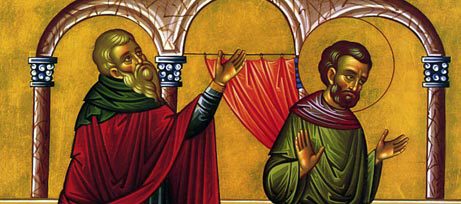by Lois Tverberg
“Woe to you, teachers of the law and Pharisees, you hypocrites! You are like whitewashed tombs, which look beautiful on the outside but on the inside are full of dead men’s bones and everything unclean.” Matthew 23:27

Jesus confronts the Pharisees many times in the Gospels, so many assume that entire group was corrupt. It may surprise you to know that Jesus’ theology and teaching style was actually very similar to theirs. The Pharisees were a movement among laypeople eager to study God’s word and apply it to their lives, and later many of them became followers of Jesus. From their passion for study they raised up rabbis who traveled the land to teach, just as Jesus did.
When we read Jesus’ seven statements of “Woe to you” it is hard to conclude that there was anything redeemable about the bunch. But believe it or not, the Pharisees were known for their own self-critical sayings that closely paralleled Jesus’ words. They used to talk about both good and bad kinds of Pharisees:
There are seven kinds of Pharisees: the “shoulder” Pharisee, who ostentatiously carries his good deeds on his shoulder so all can see them; the “wait-a-moment” Pharisee, who wants you to wait while he performs a mitzvah (good deed); the bruised Pharisee, who runs into a wall while looking at the ground to avoid seeing a woman; the “reckoning” Pharisee, who commits a sin, then does a good deed and balances the one against the other; the “pestle” Pharisee, whose head is bowed in false humility, like a pestle in a mortar; the Pharisee who asks, “What is my duty, so that I may do it?” as if he thought he had fulfilled every obligation already; the Pharisee from fear, like Job; and the Pharisee from love – like Abraham.
This passage reveals that the Pharisaic movement practiced its own honest self-examination and could see that some in their ranks had fallen into error. They list character flaws very similar to those that Jesus criticized—pride, hypocrisy, and legalism. But still they describe at least one type of Pharisee that is good— one who obeys God’s word simply out of love for him.
Several commentators have suggested that Jesus’ statements might be more like the “seven kinds” saying in another way. They suggest that instead of Jesus accusing every person in the group of the sins he names, each “woe” is is pointed at only the people are falling into those sins. Instead of saying “Woe to all of you – you’re all greedy, legalistic, and hypocritical” he was saying something like, “Woe to you who are greedy, and woe to you who are legalistic, and you who are hypocritical!” Rather than condemning the whole group, he’s pointing out the errors that the group could fall into, just as the rabbis did.
It is easy for us to read these passages smugly, as if only the foolish Pharisees could ever have fallen into these problems. Instead, we should see the sayings of Jesus and the rabbis as wise words to anyone who yearns to obey God. Taking this difficult path leads to many temptations—like slipping into pride, or legalism, or hypocrisy. We also should examine our rationale. Is the reason we are aiming for obedience because we’re terrified by what God will do to us if we don’t do everything perfectly? The only reason we should follow God’s laws is out of love for him, not for any other.
 To explore this topic more, see Sitting at the Feet of Rabbi Jesus, Zondervan, 2009.
To explore this topic more, see Sitting at the Feet of Rabbi Jesus, Zondervan, 2009.
Article photo: Brooklyn Museum


